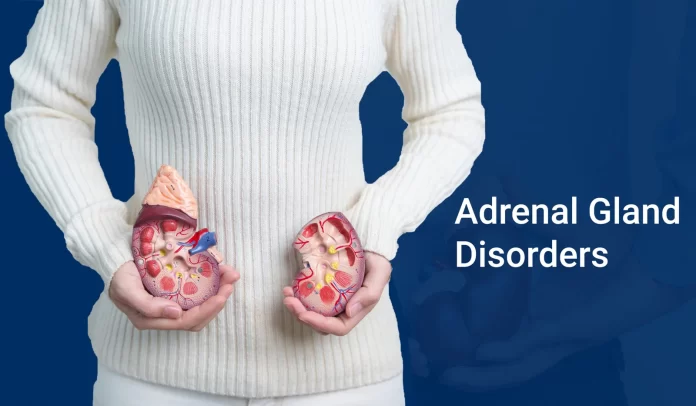Adrenal gland disorders refer to conditions that affect the adrenal glands, small organs located on top of each kidney. These glands produce vital hormones, including cortisol, aldosterone, adrenaline, and sex hormones, which regulate metabolism, blood pressure, stress response, and immune system function. When the adrenal glands produce too much or too little of these hormones, it leads to adrenal disorders.
Some common adrenal disorders include:
- Cushing’s syndrome (overproduction of cortisol)
- Addison’s disease (underproduction of cortisol and aldosterone)
- Adrenal insufficiency (chronic underproduction of adrenal hormones)
- Pheochromocytoma (tumor of the adrenal gland causing overproduction of adrenaline)
- Congenital adrenal hyperplasia (genetic condition affecting hormone production)
Symptoms:
Symptoms vary depending on the type of adrenal disorder but often include:
- Cushing’s syndrome:
- Weight gain, especially around the abdomen and face (moon face)
- High blood pressure
- Muscle weakness
- Thinning skin that bruises easily
- Purple stretch marks
- Osteoporosis
- Addison’s disease:
- Fatigue and muscle weakness
- Weight loss and decreased appetite
- Low blood pressure
- Darkening of the skin (hyperpigmentation)
- Salt cravings
- Nausea, vomiting, or diarrhea
- Adrenal insufficiency:
- Fatigue
- Low blood pressure, dizziness
- Muscle weakness
- Hypoglycemia (low blood sugar)
- Pheochromocytoma:
- High blood pressure
- Rapid heart rate and palpitations
- Excessive sweating
- Anxiety or panic attacks
- Headaches
Causes:
- Autoimmune diseases: In conditions like Addison’s disease, the immune system attacks the adrenal glands, leading to decreased hormone production.
- Tumors: Tumors in the adrenal gland, such as pheochromocytoma or adrenal adenomas, can cause hormone overproduction.
- Genetic disorders: Congenital adrenal hyperplasia (CAH) is an inherited disorder that affects adrenal hormone production.
- Infections: Infections such as tuberculosis, HIV, or fungal infections can damage the adrenal glands.
- Medications: Long-term use of corticosteroids (like prednisone) can suppress the adrenal glands, leading to adrenal insufficiency.
- Trauma or surgery: Physical damage to the adrenal glands can lead to reduced hormone production.
Treatment:
- Medications:
- For Addison’s disease or adrenal insufficiency: Hormone replacement therapy with corticosteroids (hydrocortisone or prednisone) is commonly prescribed to replace missing hormones.
- For Cushing’s syndrome: Medications that reduce cortisol production (like ketoconazole or metyrapone) may be used.
- For Pheochromocytoma: Alpha and beta blockers are given to control blood pressure and heart rate before surgical removal of the tumor.
- Congenital adrenal hyperplasia is treated with hormone replacement and medication to suppress androgen overproduction.
- Surgery:
- For adrenal tumors, surgical removal (adrenalectomy) may be necessary, especially in cases like pheochromocytoma or adrenal cancer.
- For Cushing’s syndrome caused by a pituitary or adrenal tumor, surgery to remove the tumor may be the best option.
- Radiation and Chemotherapy:
- In cases of adrenal cancer, radiation or chemotherapy may be used in conjunction with surgery.
Prevention:
While some adrenal disorders, such as congenital adrenal hyperplasia or autoimmune-related Addison’s disease, cannot be prevented, there are ways to reduce the risk of developing adrenal gland issues:
- Medication management: Long-term use of corticosteroids should be carefully managed and tapered under medical supervision to avoid adrenal suppression.
- Regular check-ups: Regular monitoring of hormone levels if you have a family history of adrenal disorders or have had previous tumors.
- Infection control: Timely treatment of infections like tuberculosis or HIV can help prevent damage to the adrenal glands.
- Healthy lifestyle: Maintaining a healthy diet, managing stress, and exercising regularly can help support overall adrenal health.

































